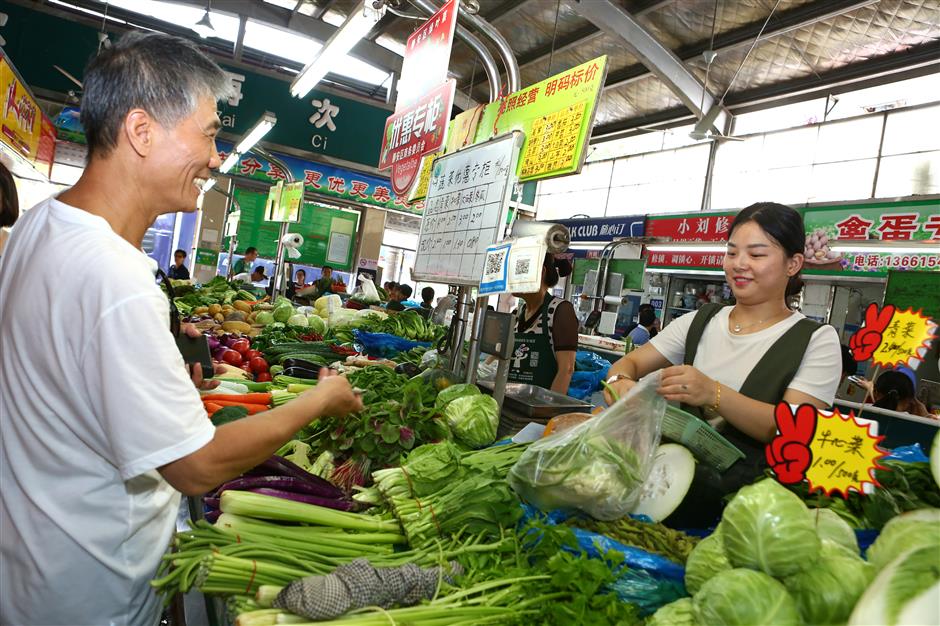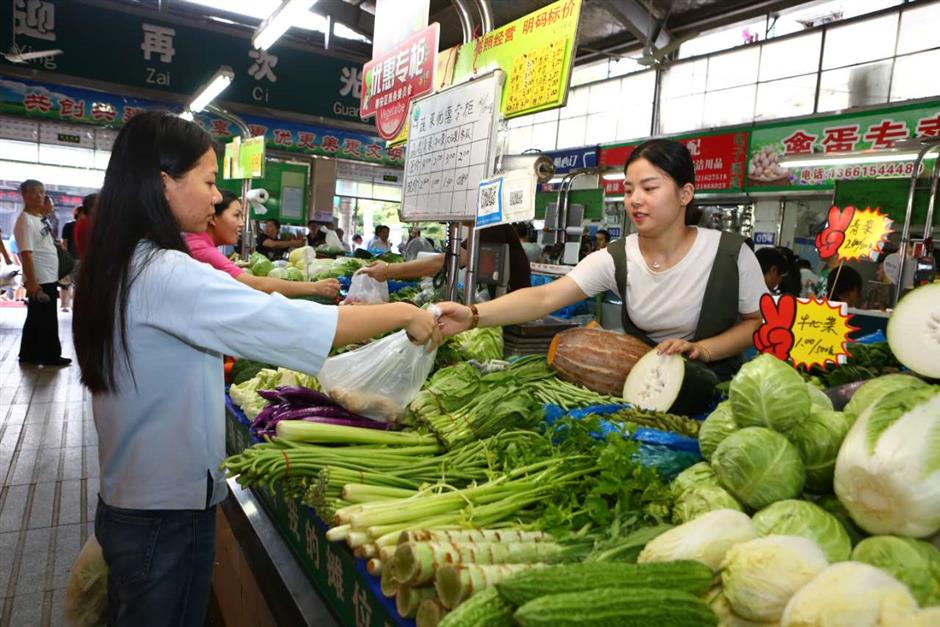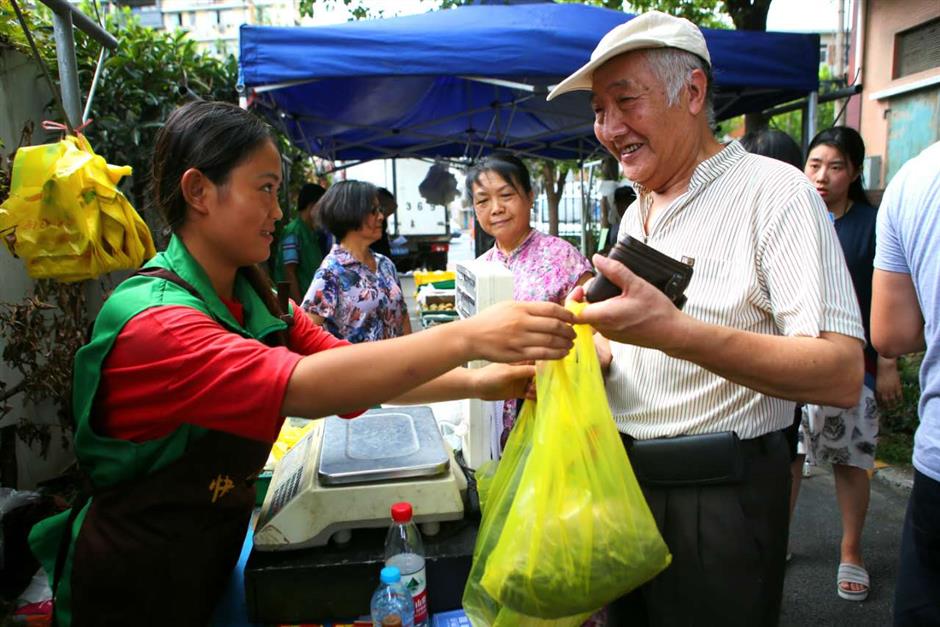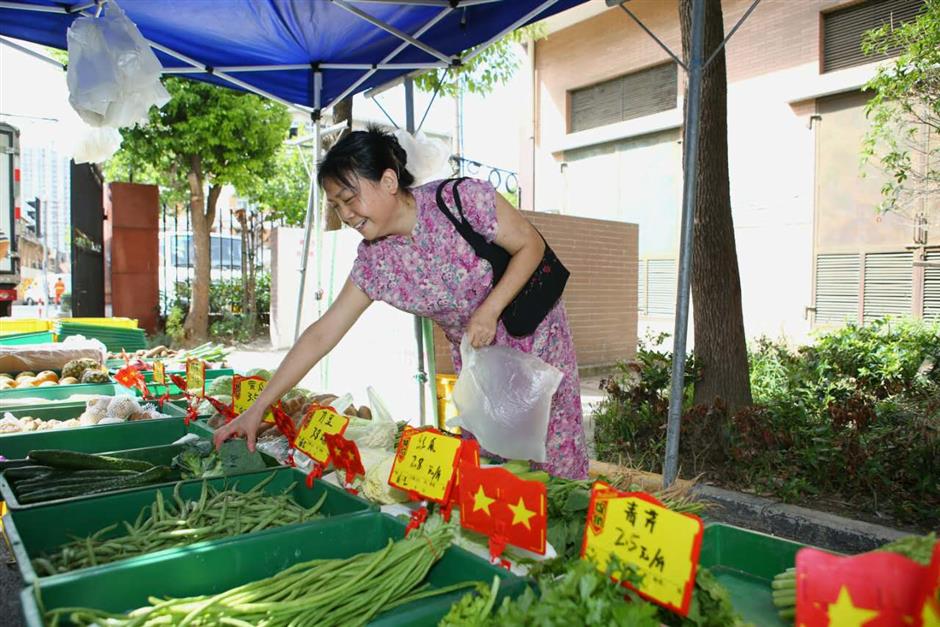City unfazed by lack of farmland

Shanghai lacks fertile farmland, but food supply is never a problem.
According to the Shanghai Commerce Commission the city has 1,100 supply bases across the country that along with imported food meets the needs of the 27 million people living and working here.
Shanghai consumes nearly 70,000 tons of agricultural products per day.
“We have 10 large-scale vegetable planting bases in Shandong, Jiangsu, and Hainan provinces, among others,” said Wu Xingbao, vice chairman of the commission. “So, we can ensure fresh and good quality vegetables in four seasons.”
The 10 bases cover an area — equating to 3,735 football fields.
“We have to meet the demands of different groups, from locals, the seniors, white-collar workers to foreign dwellers,” Wu said.
Downtown Jing’an District stands out for its efforts on the food front, such as upgrading traditional grocery markets, inserting grocery retail spots in communities and installing grocery vending machines.
Jing’an has nearly 40 grocery markets. According to the deputy district director Zhou Haiying, more than 60 percent of them have been upgraded in aspects like environment and layout. And every market has at least one “fair-price stall,” which sell assigned vegetables lower than market prices.

The Luoping grocery market, in the Gonghexin Road Community, is an example. Here the floors are clean and dry, there is no strong smell of fish. Vegetables, meat, fish and other products are all presented attractively.
“Even women in high heels don’t need to worry about slipping or getting stained with fishy smells,” Zhou said.
The market has two “fair-price stalls.” One sells four kinds of vegetables, each costing only 40 to 50 percent of the normal retail price.
“Vendors can apply to us for setting up fair-price stalls. They are required to select several vegetables that they want to sell at a low price. We will help the applicant to decide on the final four and the price,” said Huang Yisong, manager of the market.
He added, “We encourage vendors to sell cheap food. As reward, we will lower their rental fee and offer some subsidy.”
Another highlight in the market is the introduction of the “quick-test station," which allows customers to know whether what they buy contains chemical and pesticide residues. Currently, only two markets in Jing’an provide this service; the other being the Wuding grocery market of the Jiangning Road Community.
“We come here a half day per week,” said Xu Changchen, inspector from the Gonghexin Road Community Market Supervision Administration. “Every time we come here, we will test for nearly 40 to 50 customers. The top three concerns are pesticide residue in vegetables, lean meat powder in pork and sulfur dioxide in aquatic products.”

The administration’s director Ni Tongming said the hope is that by stepping up to build more such stations, the market itself will find a qualified testing agency to take over the job.
“What we do is to guide and supervise,” he said.
In Jing’an, nearly 30 percent of the population is aged over 60. To better serve them, especially those unable to walk far and carry heavy items, the district started a program about a decade ago, setting up grocery retail spots in the community.
Now, there are 74 community-based spots across the district, backed by 15 companies that have their own farmland. Each can serve an average of 300 families, said Wang Honggang, who is in charge of the program.
The spot at 220 Tianmu Road E. is one of the most popular community sites.
It opens every Wednesday and Saturday, from 6am to 9am. Vegetables, fruits, cereal and seasoning are available.
“We have our own farmland in urban areas, and thus many of our products are sold at a low price, about 10 to 15 percent lower than the market price,” said Li Guoqin, manager of the supplier, Shanghai Zhenxuan Information Technology Company.
She said: “We deliver dozens of kinds of food here. Every time, we transport nearly 750 kilograms of products, and almost always they will be sold out.”


“The nearest grocery market is a 15-minute walk from here. I can’t carry so many things, especially in these blistering hot days,” said a resident surnamed Liu, 67. “Many of my neighbors are retired workers. It’s really convenient for us.”
For youngsters and white-collar workers, who like to wake up late and rush to work in the morning, the grocery vending machine is a solution. Now, the district has 78 such machines, placed in residential complexes, offices, government bureaus and elderly care facilities.
The machines dispense packaged vegetables, poultry, and aquatic products. The prices are often as cheap or cheaper than in grocery stores.
They operate 24 hours a day, accepting cash and bankcards, and online payment systems through PayPal and WeChat. Customers can also choose to pre-order groceries online and then pick up the orders at vending machines the following day. A password is issued for collecting the purchases.
Across the city, there are 1,427 grocery vending machines. More are scheduled to be installed.















